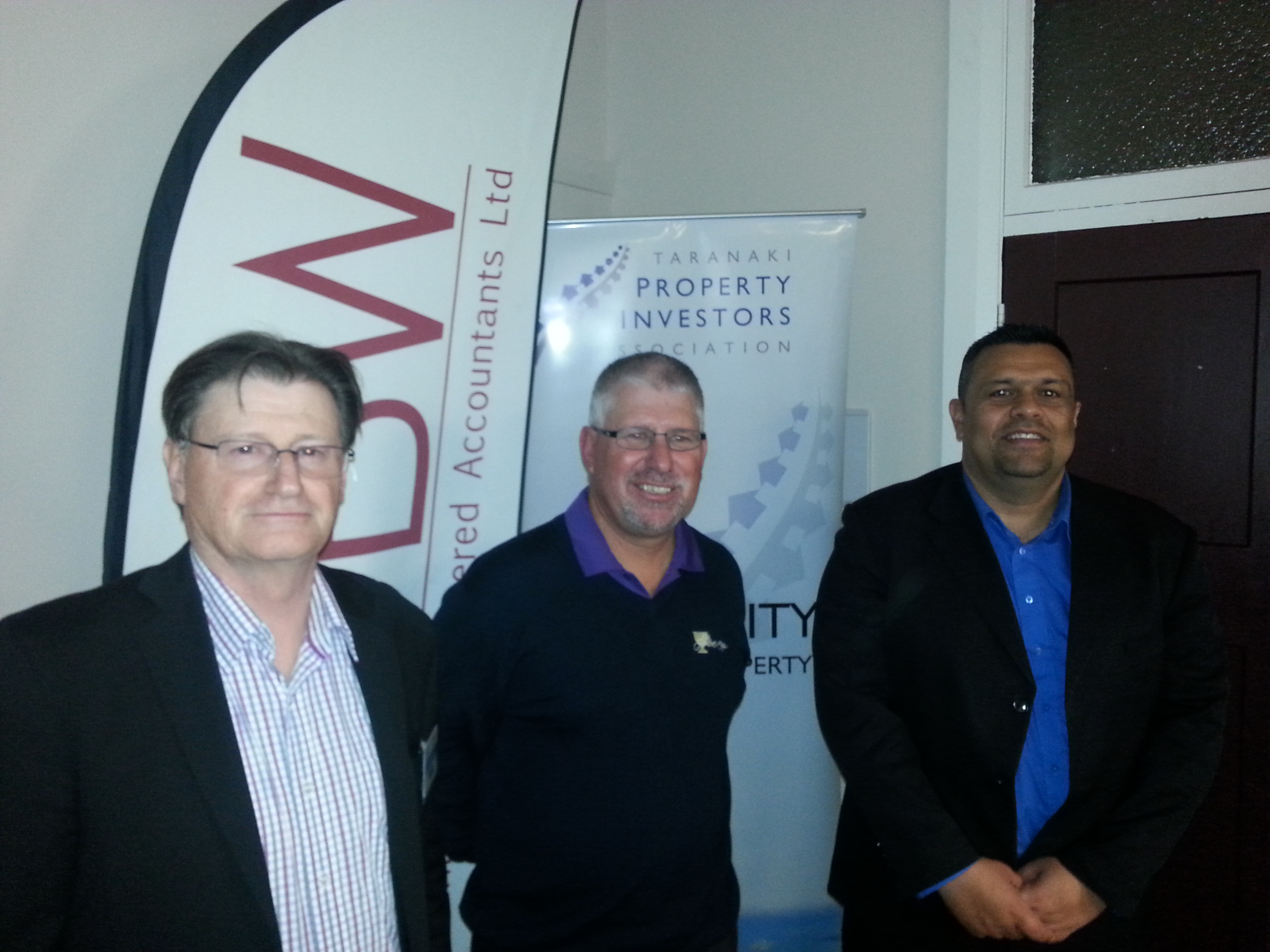Richard Woodd
Tax liability on property gains is all about declared intent
By Richard Woodd, TPIA executive member

|
At the TPIA September event (from left ) President Colin Comber, sponsor Ross Whitmore of VBW and guest speaker Harish Singh. |
Government tax investigator Harish Singh had two distinct messages when he spoke to the TPIA’s September meeting:
“If you want to avoid a conflict with the IRD over undeclared income on property transactions, you would be wise to consult an accountant because we are not in the giving advice business.
“However, members of the Taranaki Property Investors Association are most unlikely to come to our notice as they are genuine rental investors. The people we are looking for are speculators and dealers.”
Auckland-based Mr Singh is a member of one of the IRD’s five investigation teams comprising the Property Compliance Programme. This was established in 2007 and has an operating budget of $6.65m. In exchange for that it returns nearly $15m annually to its employer.
How does the IRD track and identify property owners who may be avoiding paying tax on their profits?
It has access to the Land Information NZ database which discloses the details of all property transactions, and it can even access diary notes from the discussions a borrower has with their bank when requesting a loan.
“Tell us the truth, as we will utilise all resources available to us during our audits,” he said.
The difference between an investor, a speculator and a dealer is patterns of activity and the onus of proof is on the taxpayer.
What a person intends to do with a property, is determined by their declared intent at the time of purchase. Intent may mean: investment solely for rental income; hope to make a capital gain in the future; aim to sell in a few months or a few years and make a capital gain.
“If a property is marketed for sale as a rental investment with strong capital gain potential it is taxable. If you are a true rental investor it is unlikely you will ever hear from us,” Harish said. “But owning rental property does not automatically exclude you from paying tax. If you move from being an investor to a speculator or dealer your tax liability changes.“
He described a property speculator as a person who buys or sells with the intent of making a profit without necessarily developing or improving, relying on chance or market volatility to achieve financial gain.
“This can be a one-off purchase and sale, and the length of time does not matter if the intention was for resale.
“A property dealer is one who has an established pattern of buying and selling, and it may only involve two or three properties over a number of years.”
The broad categories of property disposal which may be taxed:
Purpose or intent of resale
A business that covers dealing, developing or building
Development or subdivision begun with 10 years
Major development
Rezoning changes
A dealer’s other land
A builder’s other land
Harish Singh on some commonly held myths:
I am ok if I only sell one property per year: “It depends on your intention at time of purchase. An expressed vague or general hope of making a profitable investment is not likely to be taxable.”
If I hold it for 10 years I am ok: “There is no 10 year rule. For example, a property bought with the intent or resale for profit but which becomes a rental instead, and is sold 16 years later for a substantial gain on a market upturn, will be liable for tax.
“Gains become taxable from disposal of land within 10 years of acquisition if the land is: a dealer’s or builder’s other land (or a person associated with them). These are referred as tainting provisions. A person may hold the land in the name of a friend, business associate or relative. If the land is sold after 10 years, the gain is not taxable.”
I am always exempt from tax if I live in it: “Residential exclusion does not apply if owner has a regular pattern of buying and selling dwellings, and it cannot be claimed by a company.”
Statistics NZ figures show that rental properties are on average held for 10 years and the family home for seven years.
Sponsor motivated by the Rich List
The evening’s sponsor was Ross Whitmore, a partner in chartered accountants VanBurWray (aka VBW) which was formed in 1985 by Clarry Van T’Hof, Alwyn Burr and Neville Wray. None of the founding group remain in the company but the practice name has been kept. VBW has a staff of 45 and is owned by Ross and three others.
Ross did his accountancy exams while working for the IRD. He now specialises in small to medium businesses.
Ross is an enthusiastic member of the TPIA and a strong advocate for investing in rental property, having once discovered that those on the NBR rich list had all made their money from such investments.
Ross is a member of the tax liaison committee, a group of local accountants who meet the IRD every six months for an informal chat.
“We are lucky to have a very good IRD in New Plymouth. The stories I hear from other areas about how people are being attacked by tax inspectors and others in the IRD, is a little scary.”
Need help or
support?